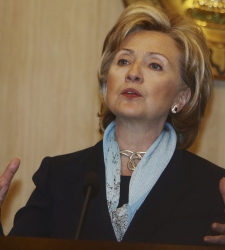
While attention focuses on candidature of Christine Lagarde, French Minister of Economy, to relieve Dominique Strauss-Kahn (accused of rape) as managing director of the International Monetary Fund (IMF), China and the U.S. are fighting hard to place one of their own as number two of this multilateral institution based in Washington.
According to European Union sources consulted by elEconomista, Beijing ruled that the emerging will constitute at this point, a united front capable of defending a number one candidate for the IMF, and break with the tradition that the position has always been occupied by an European. So Lagarde would almost enthroned, as claimed last week in Paris, especially when adding from this weekend's UK support to those previously reported from Germany and Italy.
The number two
Thus, the Chinese government focused its efforts on placing a trustworthy man as number two, a position about to be left open by American John Lipsky. The most shuffle name in the pools is Zhu Min, special adviser to Dominique Strauss-Kahn at the IMF, ex vice governor of the Chinese Central Bank and former World Bank employee.
But Beijing strikes again with the tradition, that just as the general director, number two has always been American. The Obama Administration defends David Lipton as Lipsky's successor (named by the previous Bush Administration) since he is one of those responsible for international economic policy for the White House, and ex Assistant Secretary of Treasury for International Affairs.
During the reign of Bill Clinton, Lipton had under his comand current Treasury Secretary Tim Geithner. It is assure that Lipsky recently announced his departure from the IMF when it was clear that the White House would not support his continuity and appointed his successor.
Handcuff the IMF
Lipton is a very hard character. His mission would be to ensure that, as usual, the IMF remains away from critical position that can alarm the markets about the troubled state of the accounts for the bulk of the U.S. government, whether local, state or federal.
In case the lawyer Lagarde is not set for the race to the IMF, Belgium already has a candidate in the room who publicly admitted this weekend its interest in the job, not caring that the Europeans are supposed to defend a single common candidate. It is the liberal Didier Reynders, Deputy Prime Minister of the outgoing government and Finance Minister for a decade.
Reynders could be the replacement if Lagarde is hampered by a suspected case of abuse of power, in an arbitration in which the State acted to compensate the controversial businessman Bernard Tapie.
This week
Reynders could also be taking a stand for the division of the presidency of the European Investment Bank (EIB) and European Bank for Reconstruction and Development (EBRD). The tactic that always repeats itself in these cases to please the most amount of countries grouping many offices, both bound to leave the cast of them all, and run it as the succession dates approaches in each institution involved.
A decade ago, for example, Germany clinched a Horst Köhler as IMF managing director, United Kingdom, Lord Robertson as Secretary General of NATO, Italy, Romano Prodi as president of the European Commission and France Jean-Claude Trichet as president of the European Central Bank (ECB).
The distribution of seats, at least in the IMF, should be taken care of this week in France. Today and tomorrow will be negotiated in Paris in the margins of the fiftieth anniversary of the Organization for Economic Cooperation and Development (OECD). And on Thursday and Friday, at the summit that the leaders of the G-8 held in Deauville.